- Home
- Robin McKinley
A Knot in the Grain Page 4
A Knot in the Grain Read online
Page 4
“You’re helping them,” she accused him.
“And what if I am?” he teased her, grinning.
“It’s not fair.”
The grin faded, and he looked at her thoughtfully. He picked up another small flat stone and balanced it in his hand. “You want to lift it as you throw it—lift it up again each time it strikes the water.…” He threw, and the rock spun and bounded far out toward the center of the lake; they did not see where it finally disappeared.
Sahath looked at Lily. “You try.”
“I—” But whatever she thought of saying, she changed her mind, found a stone to her liking, tossed it once or twice up and down in her hand, and then flicked it out over the water. They did not notice the green-crested black bird flying low over the lake, for they were counting the stone’s skips; but on the fourteenth skip the bird seized the small spinning stone in its talons, rose high above the water, and set out to cross the lake.
At last the bird’s green crest disappeared, and they could not make out one black speck from the haze that seemed always to muffle the farther shore.
The nights they spent in each other’s arms, sleeping in one of the long low rooms that opened off each side of the mage-master’s hall, where there were beds and blankets as if he had occasion to play host to many guests. But they saw no one but themselves.
The fourth morning they awoke and smelled cooking; instead of the cold food and kindling they had found awaiting their hunger on previous days, the mage-master was there, bent over a tiny red fire glittering fiercely out of the darkness of the enormous hearth at the far end of the great hall. He was toasting three thick slices of bread on two long slender sticks. When they approached him, he gravely handed the stick with two slices on it to Lily. They had stewed fruit with their toast, and milk from one of the master’s cows, with the cream floating in thick whorls on top.
“It is time to decide your future,” said the mage-master, and Lily sighed.
“Is it true that Sahath might have cured me … himself … at any time … without our having come here at all?” Her voice was still low and husky as if with disuse, but the slightly anxious tone of the query removed any rudeness it might have otherwise held.
The blond man smiled. “Yes and no. I think I may claim some credit as an—er—catalyst.”
Sahath stirred in his chair, for they were sitting around the small fire, which snapped and hissed and sent a determined thread of smoke up the vast chimney.
“Sahath always was pig-headed,” the master continued. “It was something of his strength and much of his weakness.”
Sahath said, “And what comes to your pig-headed student now?”
“What does he wish to come to him?” his old teacher responded, and both men’s eyes turned to Lily.
“Jolin is waiting for—us,” Lily said. The “us” had almost been a “me”; both men had seen it quivering on her lips, and both noticed how her voice dropped away to nothing when she said “us” instead.
The mage-master leaned forward and poked the fire thoughtfully with his toasting stick; it snarled and threw a handful of sparks at him. “There is much I could teach you,” he said tentatively. Lily looked up at him, but his eyes were on the fire, which was grumbling to itself; then he looked at Sahath by her side. “No,” said the master. “Not just Sahath; both of you. There is much strength in you, Lily; too much perhaps for the small frame of a baby to hold, and so your voice was left behind. You’ve grown into it since; I can read it in your face.
“And Sahath,” he said, and raised his eyes from the sulky fire to his old pupil’s face. “You have lost nothing but pride and sorrow—and perhaps a little of the obstinacy. I—there is much use for one such as you. There is much use for the two of you.” He looked at them both, and Lily saw the blue eyes again full of daylight, and when they were turned full on her, she blinked.
“I told Jolin I would not forget to come back,” she said, and her voice was barely above a whisper. “I am a healer; there is much use for me at my home.”
“I am a healer too,” said the mage-master, and his eyes held her, till she broke from him by standing up and running from the hall; her feet made no more noise than a bird’s.
Sahath said, “I have become a farmer and a carpenter, and it suits me; I am become a lover, and would have a wife. I have no home but hers, but I have taken hers and want no other. Jolin waits for us, for both of us, and I would we return to her together.” Sahath stood up slowly; the master sat, the stick still in his hands, and watched him till he turned away and slowly followed Lily.
I hold no one against his will, the master said to his retreating back; but your lover does not know what she is refusing, and you do know. You might—some day—tell her why it is possible to make rocks fly.
On the next morning Lily and Sahath departed from the stone hall and the mist-obscured lake. The mage-master saw them off. He and Sahath embraced, and Lily thought, watching, that Sahath looked younger and the master older than either had five days before. The master turned to her, and held out his hands, but uncertainly. She thought he expected her not to touch them, and she stepped forward and seized them strongly, and he smiled down at her, the morning sun blazing in his yellow hair. “I would like to meet your Jolin,” he said; and Lily said impulsively, “Then you must visit us.”
The master blinked; his eyes were as dark as evening, and Lily realized that she had surprised him. “Thank you,” he said.
“You will be welcome in our home,” she replied; and the daylight seeped slowly into his eyes again. “What is your name?” she asked, before her courage failed her.
“Luthe,” he said.
Sahath had mounted already; Lily turned from the mage-master and mounted her horse, which sighed when her light weight settled in the saddle; it had had a pleasant vacation, knee-deep in sweet grass at the banks of the lake. Lily and Sahath both looked down at the man they had come so far to see; he raised a hand in farewell. Silently he said to them: I am glad to have seen you again, Sahath, and glad to have met you, Lily.
Lily said silently back: We shall meet again perhaps.
The mage-master made no immediate answer, and they turned away, and their horses walked down the path that bordered the clearing before the hill; and just as they stepped into the shade of the trees, his words took shape in their minds: I think it very likely. Lily, riding second, turned to look back before the trees hid him from view; his face was unreadable below the burning yellow hair.
They had an easy journey back; no rain fell upon them, and no wind chilled them, and the mountain fog seemed friendly and familiar, with nothing they need fear hidden within it; and the birds still came to Lily when she whistled to them.
They were rested and well, and anxious to be home, and they travelled quickly. It was less than a fortnight after Lily had seen the mage-master standing before his hall to bid them farewell that they turned off the main road from the village of Rhungill into a deep cutting that led into the fields above Jolin’s house. As Lily’s head rose above the tall golden grasses, she could see the speck of color that was Jolin’s red skirt and blue apron, standing quietly on the doorstep of the house, with the white birches at one side, and her herb garden spread out at her feet.
Lily’s horse, pleased to be home at last, responded eagerly to a request for speed, and Sahath’s horse cantered readily at its heels. They drew up at the edge of the garden, where Jolin had run to meet them. Lily dismounted hastily and hugged her.
“You see, we remembered to come back,” she said.
The Stagman
She grew up in her uncle’s shadow, for her uncle was made Regent when her father was placed beside her mother in the royal tomb. Her uncle was a cold, proud man, who, because he chose to wear plain clothing and to eat simple food, claimed that he was not interested in worldly things; but this was not so. He sought power as a thing to be desired of itself, to be gloated over, and to be held in a grasp of iron. His shadow was not a kind
one to his niece.
She remembered her parents little, for she had been very young when they died. She did remember that they had been gentle with her, and had talked and laughed with her, and that the people around them had talked and laughed too; and she remembered the sudden silence when her uncle took their place. The silence of the following years was broken but rarely. Her maids and ladies spoke to her in whispers, and she saw no one else but her uncle, who gave her her lessons; his voice was low and harsh, and he spoke as if he begrudged her every word.
She grew up in a daze. Her lessons were always too difficult for her quite to comprehend, and she assumed that she was stupid, and did not see the glitter of pleasure in her uncle’s eye as she stumbled and misunderstood. She could only guess her people’s attitude toward her in the attitude of the women who served her, and none ever stayed long enough for her to overcome her shyness with them; and she had never in her life dared to ask her uncle a question. But as she grew older, it crept into her dimmed consciousness that her people had no faith in what sort of queen she might make when she came to her womanhood; she could feel their distrust in the reluctant touch of her waiting women’s hands. It made her unhappy, but she was not surprised.
The country did well, or well enough, under her uncle; it did not perhaps quite prosper, as it had done in her parents’ day, but it held its own. Her uncle was always fair with a terrible fairness in all his dealings, and the edge of cruelty in his fairness was so exact and subtle that no one could put a name to it. He was severe with the first man who dared question the health of the princess—too severe, with the same brilliant exactitude of his cruelty. Thus the tales of the princess’s unfitness grew as swiftly as weeds in spring, while he sat silent, his hands tucked into his long white sleeves, and ruled the country, and gave the vague, pale princess the lessons she could not learn.
He might have been Regent forever, and the queen banished to a bleak country house while her spinsterhood withered to an early death. But it was not enough for him; he wanted the country well and truly in his own hands, not only in the name of the princess, his niece. She might have died mysteriously, for his scholarship included knowledge of several undetectable poisons. But that was not sufficient either, for there would be those who felt pity for the young princess, and a wistfulness that had she lived she might have outgrown the shadow of her childhood and become a good queen, for her parents had been much beloved. There might even have been a few—a very few—who wondered about the manner of her death, however undetectable the poison.
He pondered long upon it, as the princess grew toward her womanhood and the season of her name day celebration approached. He spent more time in his tower study, and when he emerged, he looked grimmer even than was his wont, and muttered of portents. The people who heard him looked over their shoulders nervously, and soon everyone in the country was saying that there were more thunderstorms than usual this year. The Regent looked more haggard as the season progressed, for he was not a very good magician—he claimed that he knew no magic, and that magic was a false branch of the tree of wisdom; but the truth was that he was too proud and secret to put himself into a master mage’s hands to learn the craft of it—and the thunderstorms wearied him. But his increasingly drawn and solemn appearance worked to his advantage also, for the people took it as a sign that he grew more anxious.
The princess also was anxious, for on her name day she should be declared queen. She knew she was not fit, and she watched the sky’s anger and feared that it was, as her uncle declared, a portent, and that the portent warned against her becoming queen. A relief, almost, such would be, although she was enough her parents’ daughter to be ashamed of the relief, as she had long been ashamed of her lack of queenly ability. She would have gone gladly to the bleak country house—a wish flickered through her mind that perhaps away from the strict, tense life of her uncle’s court she might find one or two women who would stay with her longer than a few months—and left her uncle to rule.
Then the sightings began. Her uncle was sincerely shocked when the first countryman rushed into the royal hall to babble out his story—half a man, this thing was, half a beast. But no one had seen the Regent shocked before, and those who looked on believed that the tale only confirmed the worst of his fears. But the Regent knew, hidden deep inside himself, that he was a very poor magician, and the thing he truly feared was that in his rough calling-up of storm he had set something loose that he would not be able to control.
He withdrew to his high, bare room to brood. He had ordered another storm, and it had come willingly, but he was too shaken, now, to command it, and so it loitered uncertainly on the horizon and began to break up into wandering, harmless clouds. He did not know what to do. All that night the people saw the light in his room, and told each other the story the countryman had brought—that the thing had been seen more than once; that the farmers for fear of it would not go alone to their fields—and trembled. With a wildness born of panic, at dawn the Regent collected the scattered clouds and gave the land such a storm as it had never seen; and he descended to the great public hall again, pale but composed, his hands tucked into his sleeves, while the thunder crashed and the lightning ripped outside.
That day two more messengers came, despite the storm, with stories of sightings in two more villages: that the creature was not even half a beast, but a monster, and huge; that the women and children were afraid to leave their houses even in daylight. And these villages were not so distant as was the first man’s.
Even the princess heard the rumors, although she was not told what precisely the sightings were of; perhaps the women did not know either. But she understood that the sightings were of some evil thing, and that her people shrank from her the more for them. She dismissed her women, trying not to notice the relief in their faces, asking only that her meals be sent up to her private room. Even her last claim upon the royal economy was poorly delegated, and occasionally she missed a meal when no one remembered to bring her her tray; but someone remembered often enough, and she needed little food.
One day the door of her room opened, and she looked around in surprise, for she had been utterly alone for so long. Her uncle stood upon the threshold and frowned, but she was accustomed to his frowns, and saw nothing unusual.
“It is your name day,” he said.
She started. “I had forgotten.”
“Nonetheless, there is a … ritual … that must be performed. A ritual of … purification, most suitable for this day that you should have come into your queenship.”
She thought she understood him, and she bowed her head; but for all the years of her uncle’s domination she had a brave heart still, and it shrank with sorrow. “So be it,” she whispered. When she raised her head again, she saw there were people with him; and a woman she did not recognize laid a white robe at the foot of her bed, and stepped behind the Regent again at once, as though his shadow were a protection.
“Dress yourself,” said her uncle, and he and his attendants left her.
Four of the royal guard escorted her punctiliously to the great hall where her uncle was; and with him waited many other people, and she shrank from their eyes and their set, grim faces. Almost she turned and ran back to her empty room; but she was her parents’ daughter, and she clenched her fingers into fists beneath the too-long sleeves, and stepped forward. Her uncle spoke no word to her, but turned to the doors that led outside; and she followed after him, her eyes fixed on the back of his white gown, that she did not have to look at all the people around her. But she heard the rustle as they followed behind.
The Regent led them out of the city, and the crowd that accompanied them grew ever greater, but none spoke. The princess kept her fists clenched at first; but she had eaten so little, and been in her small room so long, that she soon grew weary, and no longer cared for the people who followed. But her pride kept her eyes on her uncle’s back, and kept her feet from stumbling. On they went, and farther on, and the sun, which had bee
n high when they set out, sank toward twilight.
The sun was no more than a red edge on a slate grey sky when they stopped at last. It was a clear night, and one or two stars were out. Her uncle turned to face his niece and the people. “Here is the place,” he said. “The place shown me in my dream, as what is to be done here was shown me.” He dropped his eyes to his niece and said, “Come.”
The princess followed numbly. They were in the hills beyond the city, beyond the place where her parents and their parents were buried. Beyond these hills were the farmlands that were her country’s major wealth, but just here they were in wild woodland. There was a small hollow in the gentle rise of the hills, and within the hollow were standing stones that led to a black hole in one hillside; and suddenly she knew where she was, and her exhaustion left her all at once, for the terror drove it out. “No,” she whispered, and put her hands to her face, and bit down on the cuff of one sleeve.
Her whisper was barely audible, but her uncle wheeled around. “I beg you,” she whispered through her fingers.
“I do only what is necessary—what I was ordered to do,” her uncle said, loudly, that the crowd might hear; but his voice was not low and harsh, but thin and shrill.
Desperately she turned around and stared at her people. There was light yet enough to see their faces palely looking back at her. They watched, mute and grim and expressionless. She dropped her hands and turned back to follow her uncle; oblivion seized her mind. The crowd waited at the edge of the hollow; six courtiers only followed the Regent and his niece, and at the mouth of the tunnel these courtiers paused to kindle the torches they carried. Then they entered the dark hole in the hillside.

 Spindle's End
Spindle's End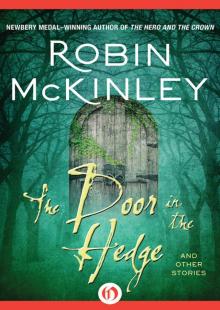 The Door in the Hedge: And Other Stories
The Door in the Hedge: And Other Stories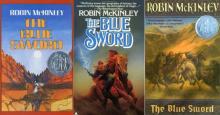 The Blue Sword
The Blue Sword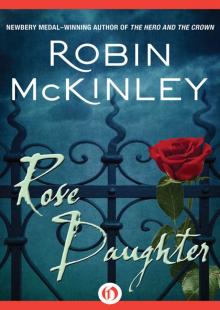 Rose Daughter
Rose Daughter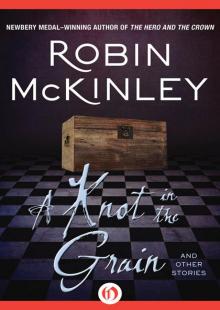 A Knot in the Grain and Other Stories
A Knot in the Grain and Other Stories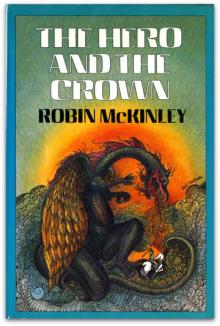 The Hero And The Crown
The Hero And The Crown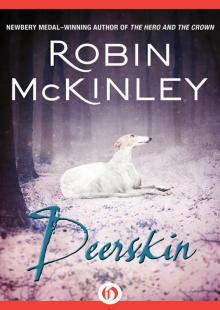 Deerskin
Deerskin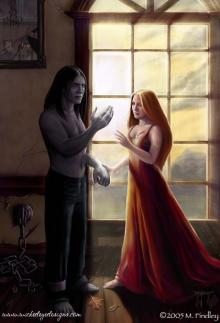 Sunshine
Sunshine Beauty: A Retelling of the Story of Beauty and the Beast
Beauty: A Retelling of the Story of Beauty and the Beast Shadows
Shadows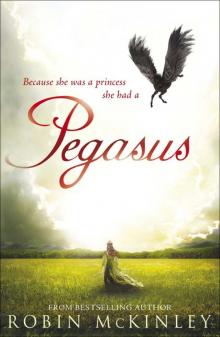 Pegasus
Pegasus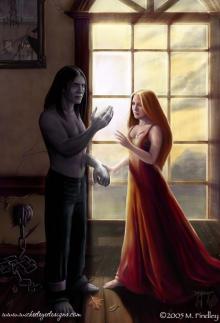 Chalice
Chalice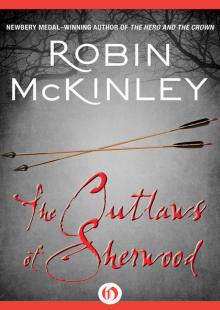 The Outlaws of Sherwood
The Outlaws of Sherwood Fire: Tales of Elemental Spirits
Fire: Tales of Elemental Spirits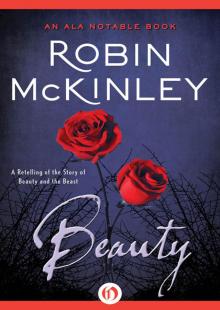 Beauty
Beauty Dragon Haven
Dragon Haven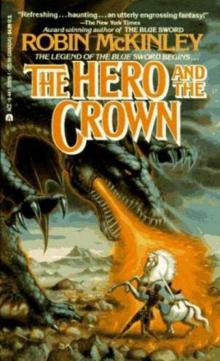 The Hero And The Crown d-2
The Hero And The Crown d-2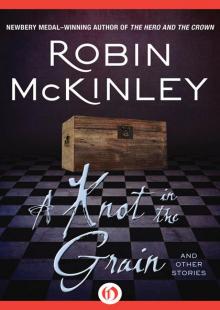 A Knot in the Grain
A Knot in the Grain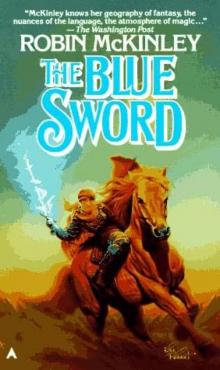 The Blue Sword d-1
The Blue Sword d-1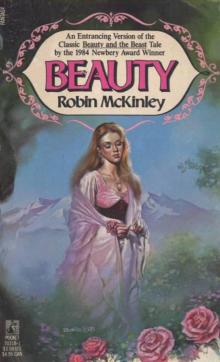 Beauty (v1.2)
Beauty (v1.2)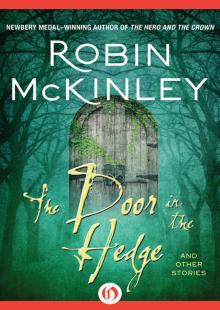 The Door in the Hedge
The Door in the Hedge